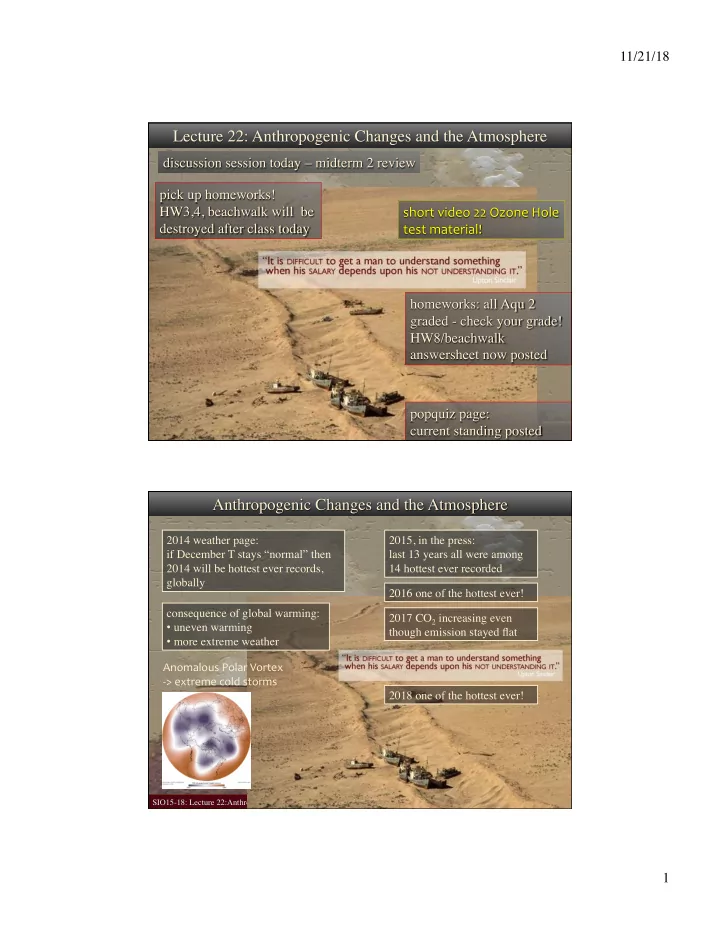

11/21/18 SIO15-18: Lecture 22:Anthropogenic Changes: The Atmosphere 2014 weather page: 2015, in the press: if December T stays “normal” then last 13 years all were among 2014 will be hottest ever records, 14 hottest ever recorded globally 2016 one of the hottest ever! consequence of global warming: 2017 CO 2 increasing even • uneven warming though emission stayed flat • more extreme weather Anomalous Polar Vortex -> extreme cold storms 2018 one of the hottest ever! SIO15-18: Lecture 22:Anthropogenic Changes: The Atmosphere 1
11/21/18 IPCC and Al Gore receive IPCC: Intergovernmental Panel on Nobel Peace Price 2007 Climate Change http://www.climatecrisis.net 2000 scientists do research and give "for their e fg orts to build up and input to panel (incl. SIO!) disseminate greater knowledge about man-made climate change, and to lay the foundations for the > 99% scientists agree that global measures that are needed to warming is real counteract such change." PEW research center survey: 2006: 77% Americans agree 2007: Inconvenient Truth 2009: 57% Americans agree TIME magazine: 2014: 40% Americans strongly agree 57% globally 71% in India 2017 U.S. Tweet of the day: “climate change is a hoax, a real hoax, fake news” SIO15-18: Lecture 22:Anthropogenic Changes: The Atmosphere page will be updated 1997: to stabilize CO 2 at 450 ppm emissions must fall to levels of 1990 by 2012 - needed 55% of producers to be ratified - 2004: ratified after Russia joined; in effect Feb 2005 - 2007: Australia joined leaving this would have given U.S. only industrial country not to join us a 1.5ºC increase by 2100 “it would hurt our economy” … from pre-industrial levels as of 2012 green: agreed light green: developing world red: withdrawn orange: no intention to ratify “it would hurt our economy” grey: no position SIO15-18: Lecture 22:Anthropogenic Changes: The Atmosphere 2
11/21/18 page will be updated 2009: Copenhagen Accord: � endorse continuation of Kyoto Protocol 2ºC is more than � global increase in T should be less than 2ºC Kyoto Protocol (compared to pre-industrial) � recognize CO 2 increase by deforestation - 2010: Cancun; issues involved: - 2011: South Africa; cap-and-trade - 2012: Qatar CO2 vs all GHG - 2013: Warsaw top 3 emitters 2015 China’s grace period - 2014: UN (greenhouse gases): - 2015: Paris China (20.1%) - 2016: Marrakesh ??? U.S. (17.9%) China passed USA as Russia (7.5%) top emitter in 2009 Indonesia 3 rd by (deforestation) Indonesia: 85% through deforestation 15% rest SIO15-18: Lecture 22:Anthropogenic Changes: The Atmosphere page will be updated 2015 Paris Agreement: continue Kyoto Protocol in some form as of Oct 2016: 193 parties signed; 110 ratified; went into effect Nov 4, 2016 For the very first time, U.S. is on board….. until 2017 BIGGEST ISSUES: � verification that countries fulfill reduction � doesn’t go as far as the Kyoto Protocol � different countries have different commitments � new U.S. administration U.S. Tweet of the day: “gonna hurt our economy, hurt bad, real bad. We exit! We’re the greatest” “make American coal great again, real great! Coal is clean energy. Maybe even renewable?” newsclips: 11/08/17 Syria to join climate pact; U.S. only nation out 11/14/17 White House ridiculed at Bonn, Germany climate-change talks SIO15-18: Lecture 22:Anthropogenic Changes: The Atmosphere 3
11/21/18 some areas may benefit from warmer climate BUT - weather more extreme - deserts expanding - Midwest may become too dry -> food production? - polar regions lose ice -> catastrophic consequences For wildlife and people - food chain - encroachment - diseases SIO15-18: Lecture 22:Anthropogenic Changes: The Atmosphere - 1.5ºC higher than pre-industrial levels increasingly unlikely - 2.0ºC if EVERYBODY sticks with Paris agreement - 3.2ºC or more with business as usual - plants and insects (POLLINATORS!!) most affected 2018 IPCC report/homework 5/ aquarium trip 2 - food shortages, wildfires, coral mass die-offs - 1.5ºC likely reached by 2040 !! - inundated coastlines, intensifying droughts, poverty Science News Jun 2018 - mistake made earlier: predictions that these effects kick in with a 2.0ºC increase by 2040 SIO15-18: Lecture 22:Anthropogenic Changes: The Atmosphere 4
11/21/18 Homework 5: greenhouse emission must be reduced by 45% from 2010 levels by 2030, and 100% by 2050 Implications: electricity from coal (currently 40 %) must be reduced to 1-7 % renewable energy must increase (currently 20%) to 67 % SIO15-18: Lecture 22:Anthropogenic Changes: The Atmosphere 1993 2000 “Arctic summer ice free soon” SIO15-18: Lecture 22:Anthropogenic Changes: The Atmosphere 5
11/21/18 “how do we know it’s us?” SIO15-18: Lecture 22:Anthropogenic Changes: The Atmosphere China: explosive increase in coal burning -> CO 2 ; SO 2; mercury SIO15-18: Lecture 22:Anthropogenic Changes: The Atmosphere 6
11/21/18 SIO15-18: Lecture 22:Anthropogenic Changes: The Atmosphere source: IPCC 2014 SIO15-18: Lecture 22:Anthropogenic Changes: The Atmosphere 7
11/21/18 this implies that we just passed the 1ºC increase compared to pre-industrial age (0.9 – (-0.2) = 1.1ºC) it also shows the dramatic increase in the rate of warming since 2010! source: wikipedia SIO15-18: Lecture 22:Anthropogenic Changes: The Atmosphere SIO15-18: Lecture 22:Anthropogenic Changes: The Atmosphere 8
11/21/18 SIO15-18: Lecture 22:Anthropogenic Changes: The Atmosphere source: Keller and Blodgett “Natural Hazards” &World Watch Institute SIO15-18: Lecture 22:Anthropogenic Changes: The Atmosphere 9
11/21/18 SIO15-18: Lecture 22:Anthropogenic Changes: The Atmosphere U.S. Tweet of the day: “make American coal great again, real great!” source: IPCC 2014 SIO15-18: Lecture 22:Anthropogenic Changes: The Atmosphere 10
11/21/18 source: IPCC 2014 SIO15-18: Lecture 22:Anthropogenic Changes: The Atmosphere 11
Recommend
More recommend